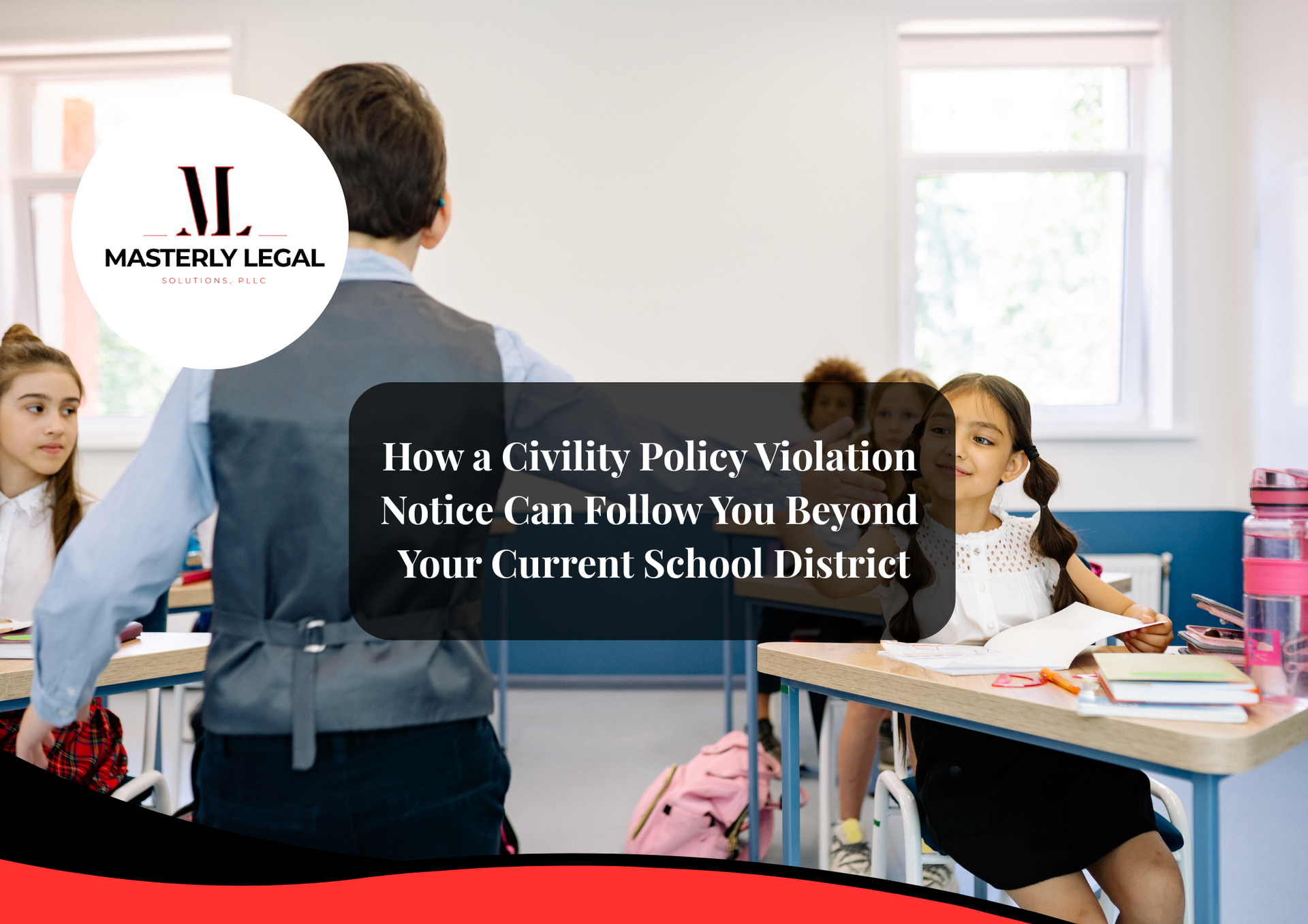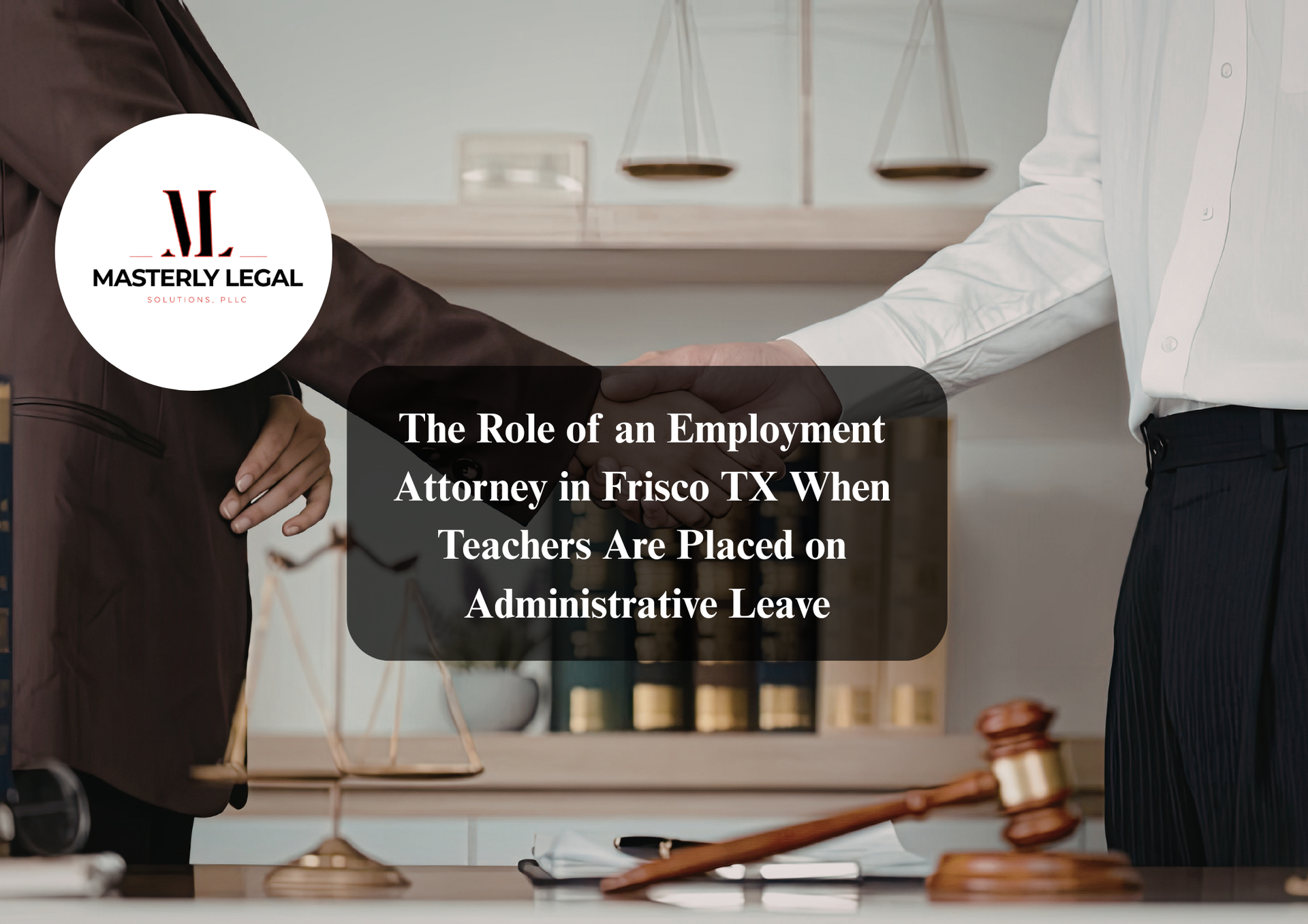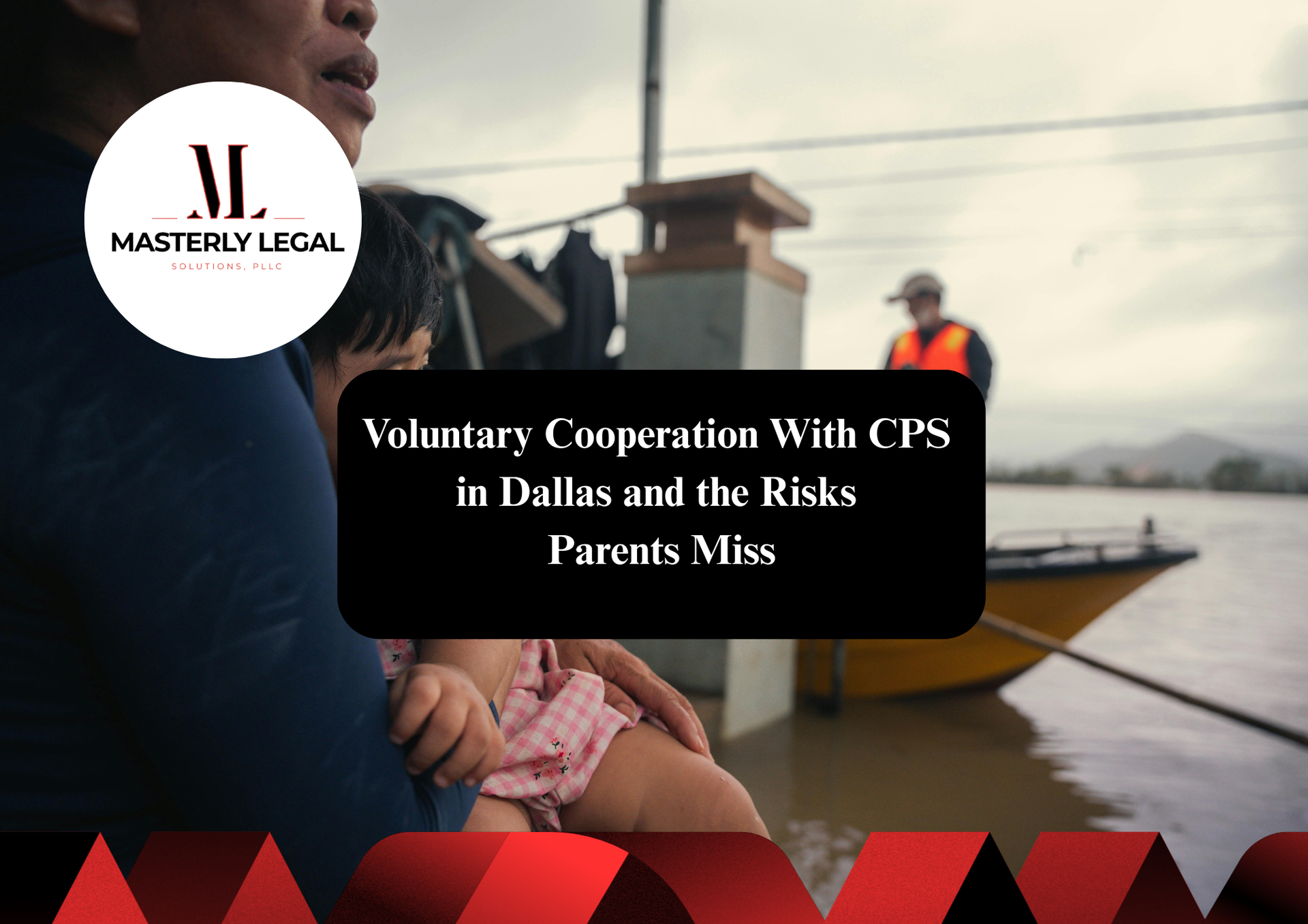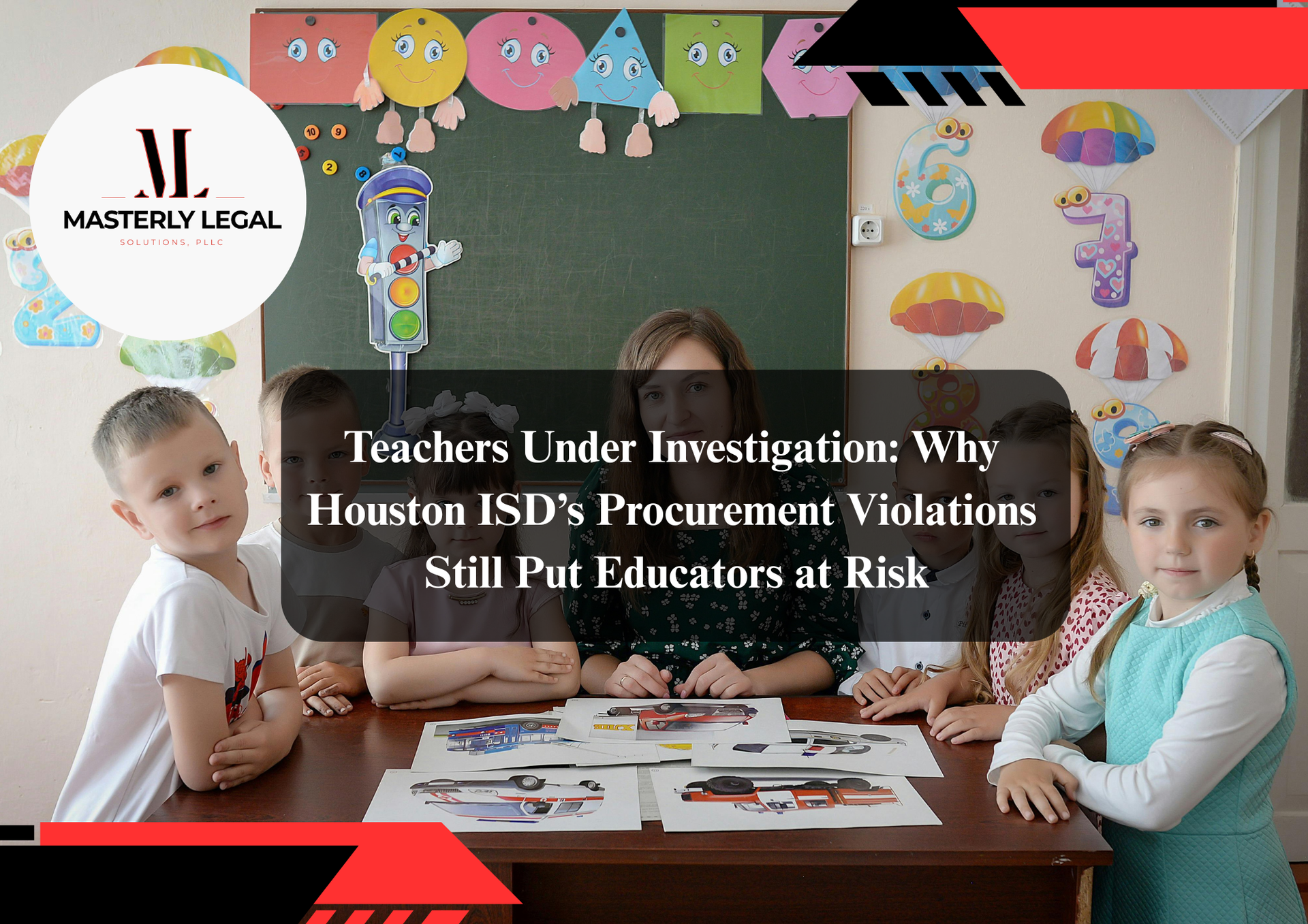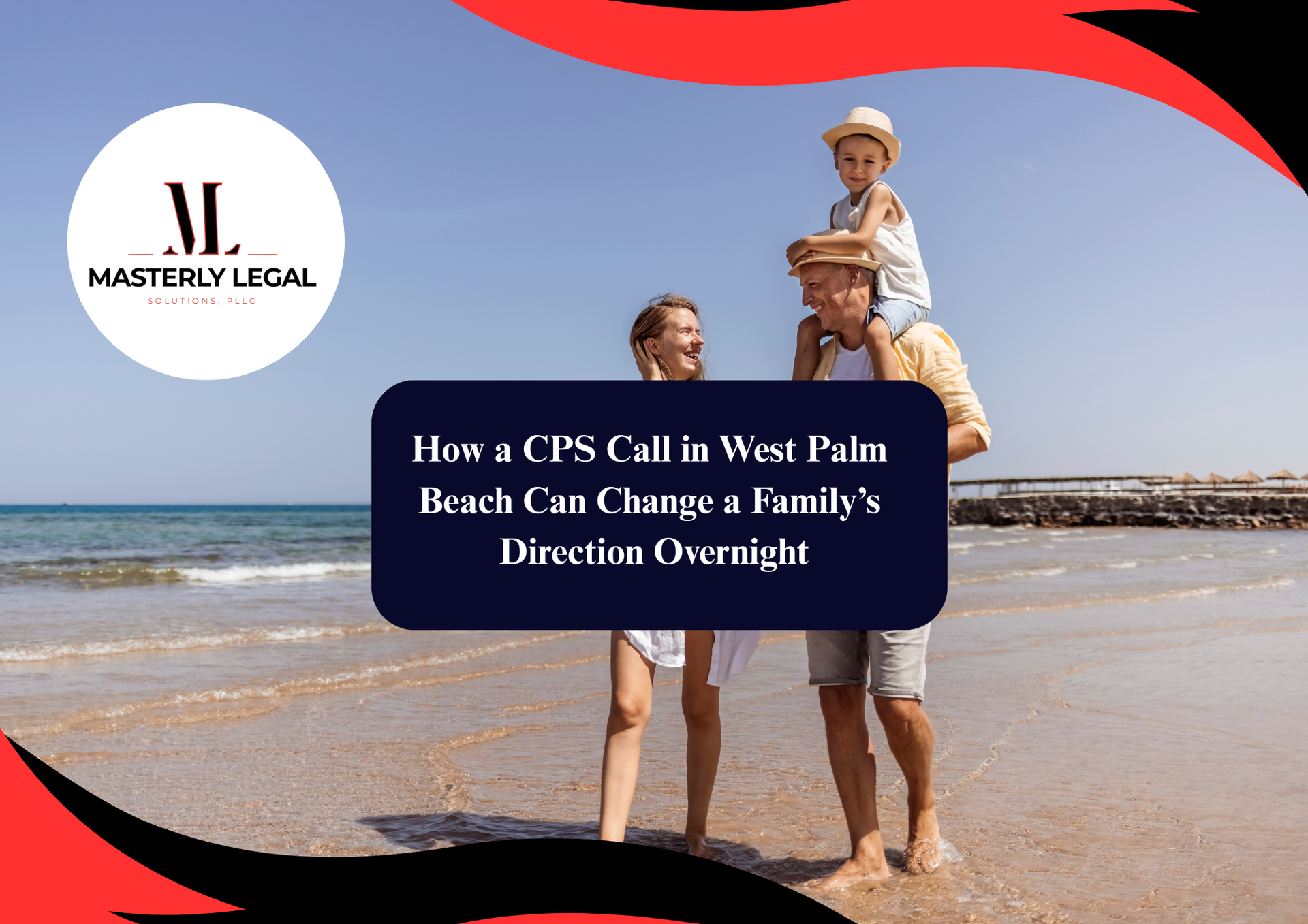The FERPA Fine Print: What Most Colleges Get Wrong About Student Privacy
Understanding the Scope of FERPA in Higher Education
The Family Educational Rights and Privacy Act (FERPA) is a cornerstone of federal laws governing student privacy. It applies to all higher education institutions that receive federal funding. FERPA gives students specific rights over their information and is intended to safeguard the privacy of student education data.
Yet many colleges and universities underestimate how strictly the law is interpreted. Missteps in interpreting FERPA can expose higher education institutions to both federal enforcement and private lawsuits. This is not just a policy matter—it's a legal and financial liability issue.
Common Misinterpretations and Costly Mistakes
Educational institutions often believe FERPA applies only to transcripts and grades. In reality, FERPA's definition of "education records" is broad. It includes:
- Disciplinary actions
- Financial aid details
- Academic misconduct reports
- Student housing documentation
- Counseling records maintained by the institution
Even general counsel teams with extensive experience may overlook key areas when FERPA regulations intersect with campus culture and operational workflows.
Mistakenly Disclosing Information
One of the most frequent FERPA violations occurs when college staff share student information without proper consent. This can happen through:
- Sharing grades with parents without student permission
- Discussing a student’s disciplinary record in meetings
- Emailing confidential student data to unintended recipients
For private colleges and public community colleges alike, such disclosures violate federal and state law. Even well-meaning faculty or staff may trigger compliance problems that can escalate into investigations.
Student Consent: The Often-Ignored Rule
FERPA requires written consent before disclosing personally identifiable information (PII) from education records. There are exceptions, but they are limited and strictly interpreted. Failure to document consent properly is one of the leading causes of FERPA violations.
Colleges and universities must:
- Train faculty and staff on consent policies
- Maintain documentation of all granted consents
- Apply consistent practices across departments
Institutional clients that don’t address this risk leave themselves open to regulatory compliance audits by federal agencies.
Misclassifying Records
Another frequent error involves the misclassification of records. Some academic institutions believe certain files are not "education records" under FERPA when they actually are. Misclassified records may include:
- Notes maintained by student affairs staff
- Records related to student disability accommodations
- Campus law enforcement records not stored separately
These missteps can result in failure to respond properly to records requests under FERPA or the Public Records Act.
Missteps in Crisis Management and Emergency Disclosures
FERPA does allow for disclosure during emergencies. However, the definition of an "emergency" is narrower than many administrators assume. Legal challenges often arise when institutions share student data under the guise of crisis management without clear documentation.
Your education team must follow clear guidelines that align with applicable laws. Without a higher education lawyer reviewing these policies, assumptions may lead to exposure.
Faculty and Staff Training Gaps
One of the most overlooked issues in the higher education sector is inadequate training. Faculty often hold roles that intersect with student life and student discipline. Without a deep understanding of FERPA, they may inadvertently:
- Email protected records to peers
- Share details in open academic forums
- Post grades in public settings
Higher education attorneys recommend that institutions implement annual FERPA training as a core part of human resources and student affairs programming.
Employment Law and Dual FERPA Challenges
Labor and employment issues often intersect with FERPA, especially in cases involving graduate students or student workers. For example:
- A former student sues under age discrimination and seeks access to employment-related files
- An institution is unclear whether an employee's file is protected by FERPA or employment law
In these complex matters, legal and practical issues require coordinated strategies from both higher education law specialists and labor law counsel.
Complications from Third-Party Vendors
Many colleges and universities now outsource core functions to third-party platforms. This includes learning management systems, housing apps, and counseling services. These partnerships complicate FERPA compliance because:
- Vendors may not understand their legal responsibilities
- Contracts might lack FERPA-specific clauses
- Breaches or mishandling can still reflect back on the academic institution
Our higher education team helps institutional clients negotiate government contracts and vendor relationships that prioritize student privacy.
Intersection with Other Federal Laws
FERPA rarely operates in isolation. It intersects with multiple federal laws, such as:
- Title IX compliance
- The Disabilities Act
- Federal employment law
- Government agency rules on financial aid
Only higher education lawyers with extensive experience can ensure that FERPA is balanced alongside these other legal frameworks. Oversight in one area can expose gaps in others.
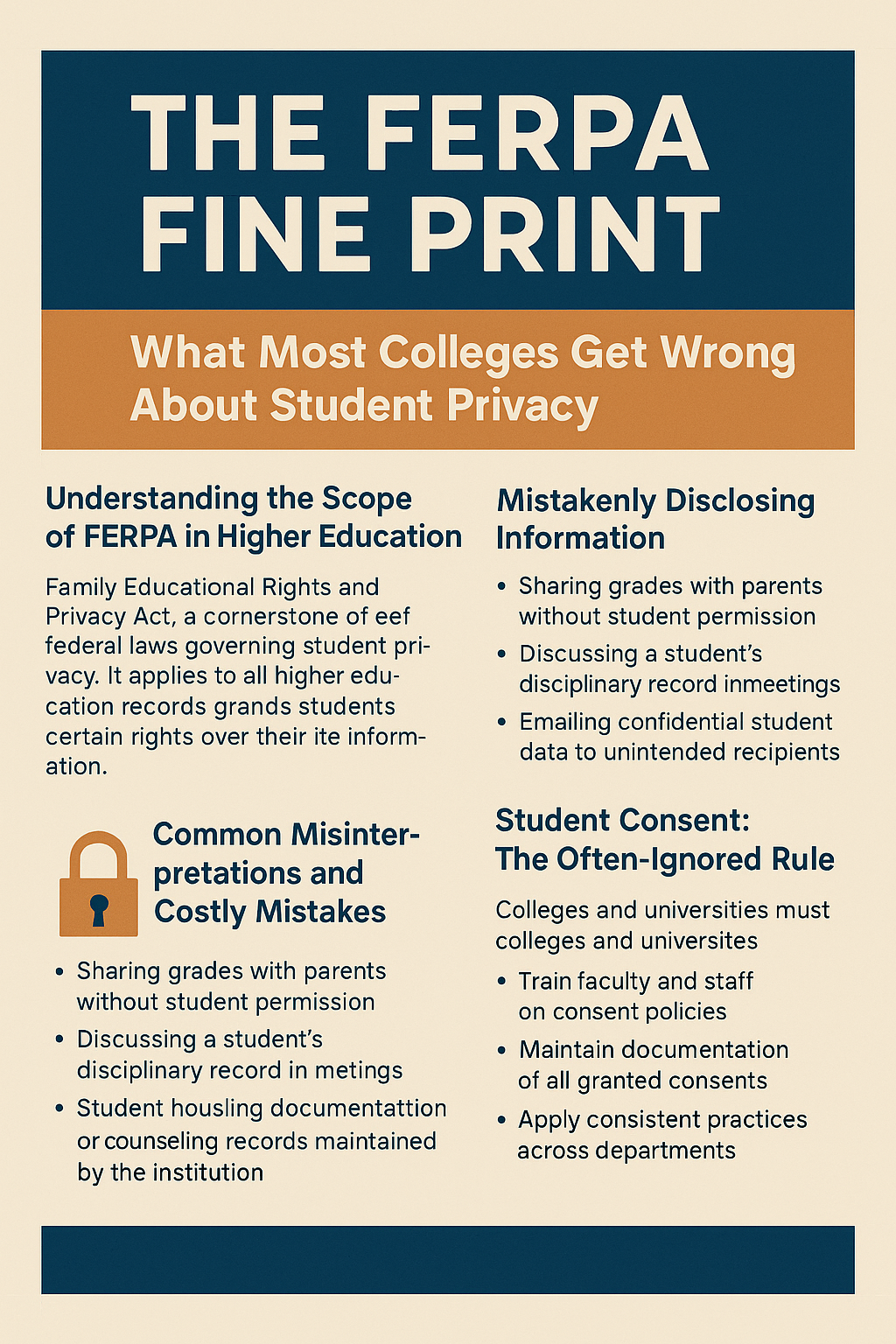
NCAA Compliance and Student-Athletes
College campuses often face FERPA questions tied to student-athletes. Are athletic performance records protected? What about scholarship negotiations or academic progress reports?
Legal counsel should advise institutions on how FERPA applies to NCAA compliance issues, including how family educational rights are maintained under high-pressure public scrutiny.
Academic Misconduct and Public Records Requests
Allegations of academic misconduct are increasingly subject to FERPA scrutiny. When records are requested under state public records laws, institutions must decide whether FERPA protections override the disclosure.
College and university attorneys must carefully evaluate each case to balance transparency with student privacy. Incorrect judgment can lead to legal disputes or penalties.
FERPA in the Age of Digital Learning
The shift to online and hybrid education models has intensified FERPA obligations. Emails, cloud-stored files, and video platforms all introduce privacy risks. Institutions must evaluate:
- How data is stored and who has access
- Whether remote faculty are trained in FERPA
- Which platforms meet security and compliance standards
Educational institutions that fail to audit these digital practices put themselves at odds with state and federal law.
FERPA, Faculty Tenure, and Academic Freedom
Faculty tenure disputes can involve student testimony, evaluations, or grade-related data. But sharing that information during grievance hearings can create conflicts with FERPA.
Legal counsel must navigate the tension between academic freedom and legal compliance. Our college and university attorneys frequently support institutions in striking this delicate balance.
The Role of Student Handbooks and Policy Documents
Student handbooks often serve as the first line of communication on FERPA rights. However, vague or outdated language can mislead students and staff alike.
A comprehensive review by a higher education attorney ensures:
- Accurate alignment with federal guidelines
- Legal risk minimization
- Better communication with students and parents
Supporting institutions in drafting student handbook language is a key part of our higher education practice.
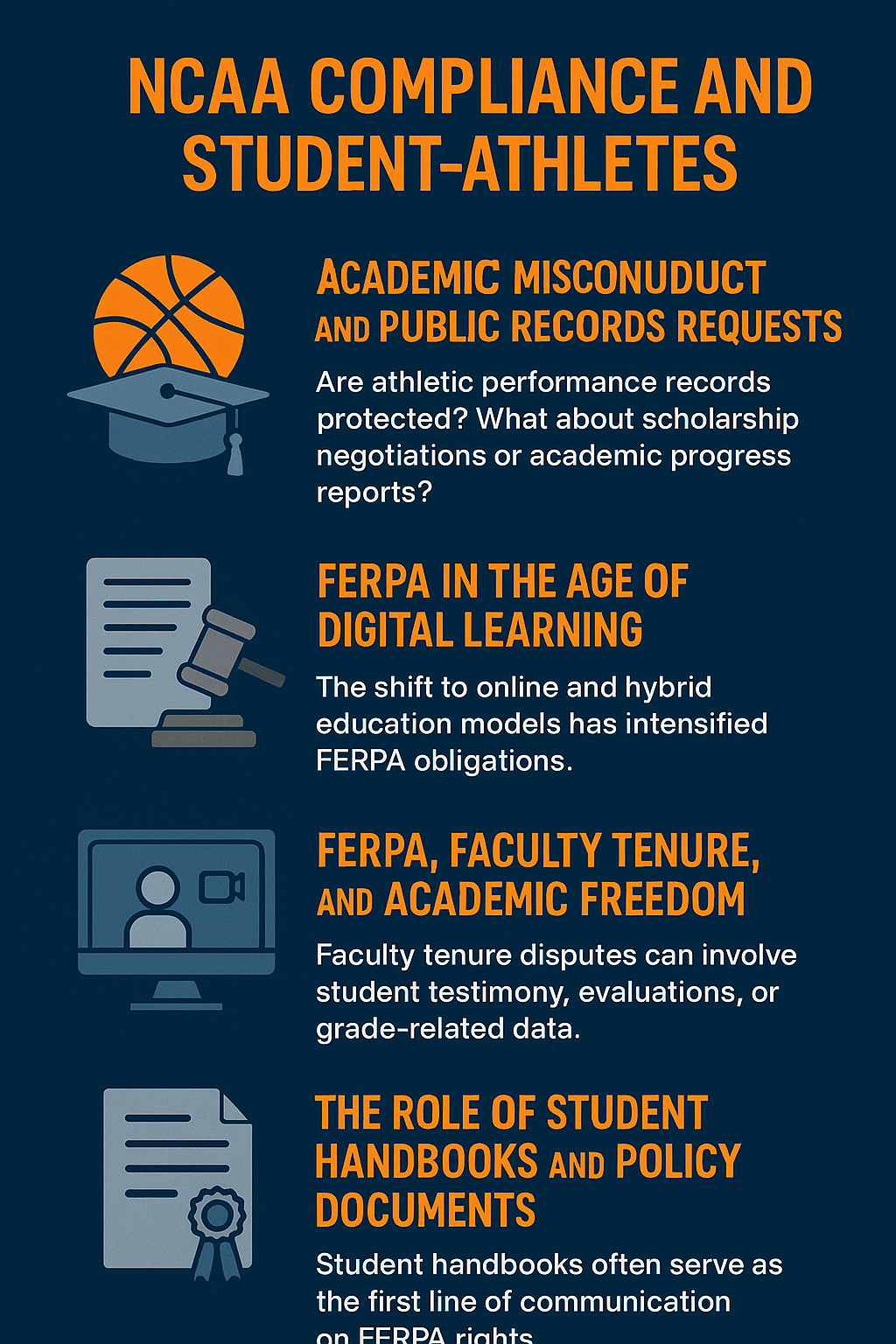
Legal Obligations of Board Members and Leadership
Board members must understand that failure to comply with FERPA can bring reputational and financial harm. Leaders in the higher education industry are accountable for ensuring that institutional practices meet regulatory compliance standards.
Our education team provides briefings and strategic planning sessions for senior leadership to maintain full alignment with legal obligations.
Collective Bargaining and Record Sharing
In some cases, faculty unions may request access to documents that are part of student records. During collective bargaining or labor disputes, this access may conflict with FERPA restrictions.
Our firm has handled cases where higher education clients needed clarity on what could be legally shared. We provide real-time support to resolve conflicts without violating applicable laws.
Government Agencies and FERPA Enforcement
Government agencies such as the Department of Education are increasingly active in FERPA enforcement. Triggers for investigation include:
- Student complaints
- Media coverage
- Publicized data breaches
College and university clients should not wait for a complaint to arrive. Proactive legal review prevents escalation.
Public and Private Institutions Face Different Challenges
While FERPA applies broadly, the challenges faced by a private higher education institution may differ from those at public universities. Private institutions must often balance federal mandates with different internal governance models.
At Masterly Legal Solutions, we advise both public and private academic institutions with tailored strategies based on their unique structure and risk profile.
Government Contracts and Privacy Liability
Higher education institutions that enter into federal or state contracts must ensure FERPA clauses are explicitly covered. Lack of clarity in contract language can result in:
- Breach of contract lawsuits
- Privacy violations
- Penalties from contracting agencies
Our legal practices support institutions from contract negotiation through implementation.
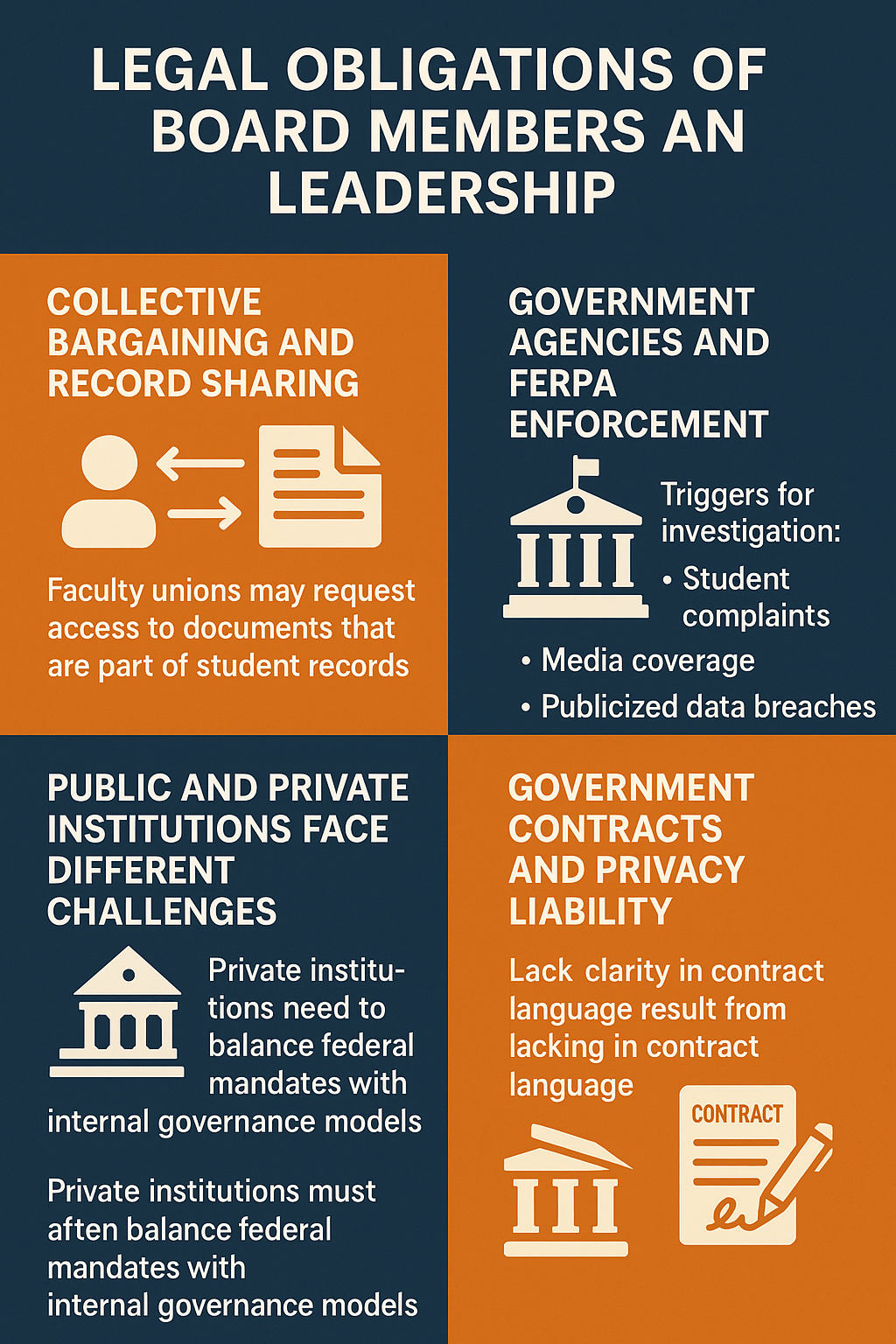
Addressing FERPA in Sexual Misconduct Investigations
Sexual harassment and sexual misconduct cases often test the limits of FERPA protections. Investigations must preserve student privacy while adhering to Title IX compliance obligations.
Our higher education attorneys are equipped to advise institutions handling sensitive, high-stakes investigations that demand strict legal precision.
Partnering with Outside Legal Counsel
Many colleges and universities rely on in-house general counsel. But in cases involving FERPA violations or investigations, specialized outside counsel can bring:
- Unbiased perspective
- Crisis management expertise
- Specific knowledge of higher education law
Our firm partners with school groups and legal departments to enhance internal capacity and reduce exposure.
FERPA's Role in Employment Contracts and Faculty Disputes
Employment contracts may reference student-related data. Disputes involving student complaints, course evaluations, or academic appeals can lead to employment relationship breakdowns.
Proper legal practices ensure that privacy is preserved without violating employee rights or employment law protections.
Final Thoughts and Next Steps
FERPA compliance is more than a bureaucratic task—it’s a critical component of a higher education institution’s legal foundation. Missteps can be costly, damaging, and entirely avoidable with the right guidance.
At Masterly Legal Solutions, we help support institutions across the higher education industry to identify, prevent, and respond to legal risks involving student privacy. Our higher education team has the deep understanding necessary to advise institutions through legal and practical issues at every level.
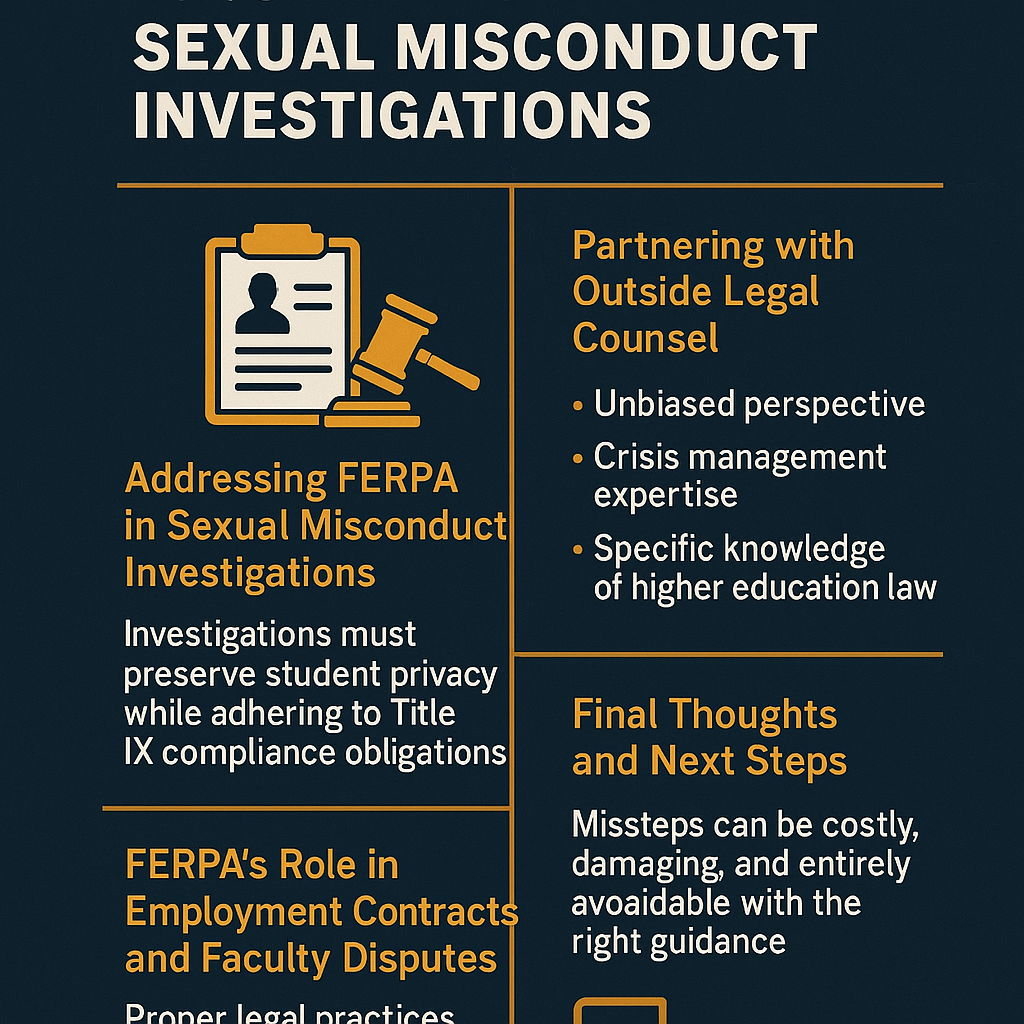
Expanding the Privacy Conversation: When FERPA Intersects with Broader Institutional Compliance
FERPA violations rarely occur in isolation. They often overlap with matters related to tax compliance, employee classification, and intellectual property. For instance, unrelated business income tax issues can arise when student records are mishandled in commercial partnerships, such as licensing student-created content or monetizing academic programs. Similarly, disputes before the National Labor Relations Board may involve student workers whose FERPA-protected data is relevant in collective actions.
When employee benefits documentation includes details tied to student employment, these records must be carefully reviewed for compliance. Additionally, intellectual property rights often overlap with student-generated materials in research settings, making it critical to understand how FERPA interacts with copyright protections. Institutions affiliated with a national association or consortium may also be subject to added oversight or policy mandates requiring stricter privacy controls. Addressing FERPA in a vacuum is no longer sufficient; legal counsel must take a multidimensional approach to support higher education clients effectively.
FERPA and the Overlap with Labor and Employment Issues in Academia
Higher education institutions often face complex labor and employment issues that intersect with FERPA protections in unexpected ways. For example, when faculty evaluations include student feedback, or when disciplinary actions involving student employees are documented, education records can become central in employment disputes.
Mismanaging these records not only risks violating FERPA but can also trigger claims under employment law. Whether addressing grievances from unionized faculty, contract disputes with graduate assistants, or complaints of discrimination involving students and staff, it’s essential that colleges and universities consult with legal counsel who understand both sides of the compliance equation. The failure to properly distinguish protected education records from employment files can escalate into legal challenges and reputational harm.
Institutional Gaps in FERPA Compliance: Risk Areas for Private Colleges and National Associations
For private colleges, FERPA compliance often intersects with administrative practices tied to human resources and faculty management. In particular, documentation related to employee benefits—such as tuition remission for dependents or health coverage for student workers—may include information that is also classified as education records under FERPA. Improper handling of these dual-purpose records can lead to privacy violations and regulatory penalties. Moreover, colleges affiliated with a national association may follow consortium-wide guidelines that fail to address specific privacy obligations under federal law. These one-size-fits-all policies often overlook unique compliance vulnerabilities at the campus level. Our firm helps institutional clients close these gaps and develop FERPA-aligned procedures that respect both individual privacy rights and administrative efficiency.
FERPA Challenges on College Campuses: When Privacy Rules Clash with Labor Law
Modern college campuses are dynamic environments where academic, administrative, and employment roles often overlap. In this complex setting, FERPA protections must be balanced against evolving labor law obligations. For example, when student workers are involved in disputes related to scheduling, wages, or union activity, their employment records may be entangled with protected education records. Mishandling these situations can lead to violations of both FERPA and employee rights under federal or state labor statutes. As unionization efforts grow among graduate students and campus staff, institutions must ensure that their FERPA policies are not inadvertently suppressing labor rights or exposing them to legal risk. Legal counsel with expertise in both education and labor law is essential for institutions seeking to operate compliantly in these overlapping domains.
Speak With a Higher Education Lawyer Today
Navigating the fine print of FERPA doesn’t have to be overwhelming. If you're a college or university administrator, board member, or general counsel concerned about regulatory compliance, it’s time to talk to someone who understands the higher education sector inside and out.
Contact Masterly Legal Solutions today at (972) 236-5051 for a free consultation. Our experienced higher education attorneys are here to help you make informed decisions, reduce risk, and strengthen your institution's legal foundation.
Let us help you build smart, compliant systems so you can focus on what matters most: educating your students.
Disclaimer: This article is for informational purposes only and does not constitute legal advice. For legal guidance tailored to your institution's situation, please contact a licensed attorney.
Looking for Legal & Business Solutions? Contact Us Now
Fill in the form or call us to set up a meeting

